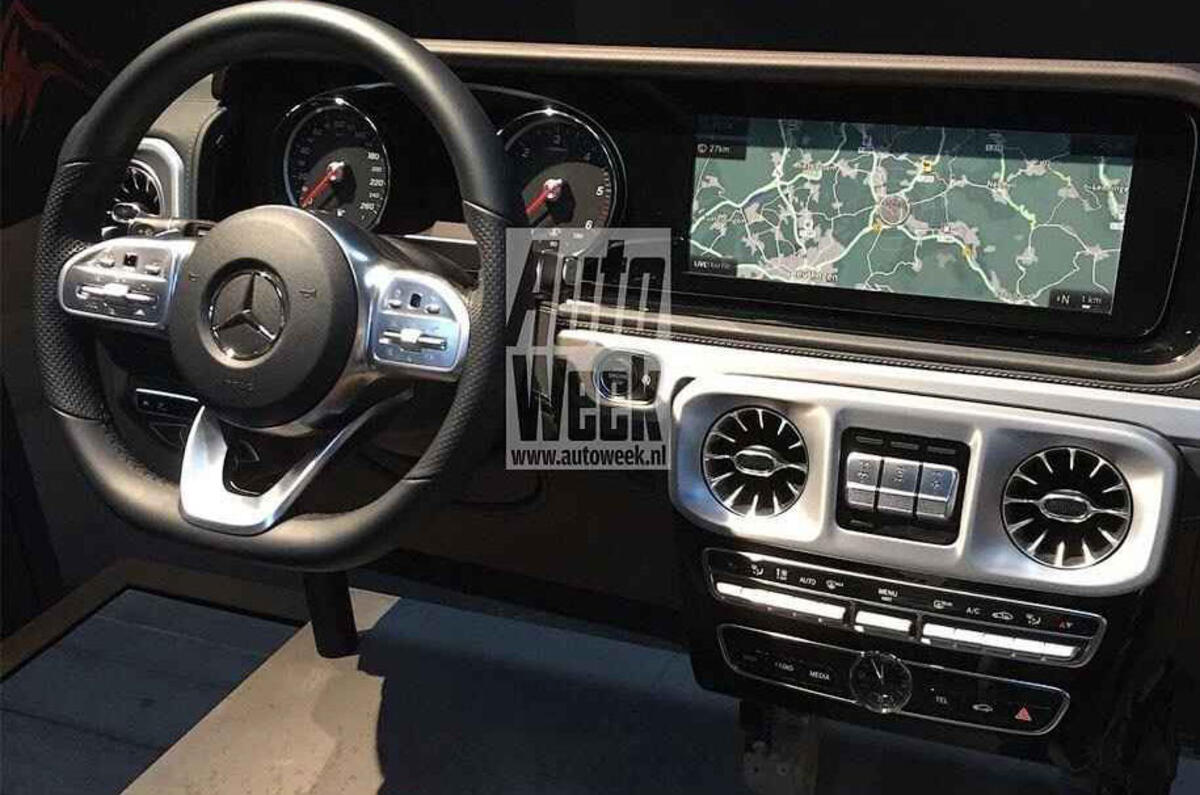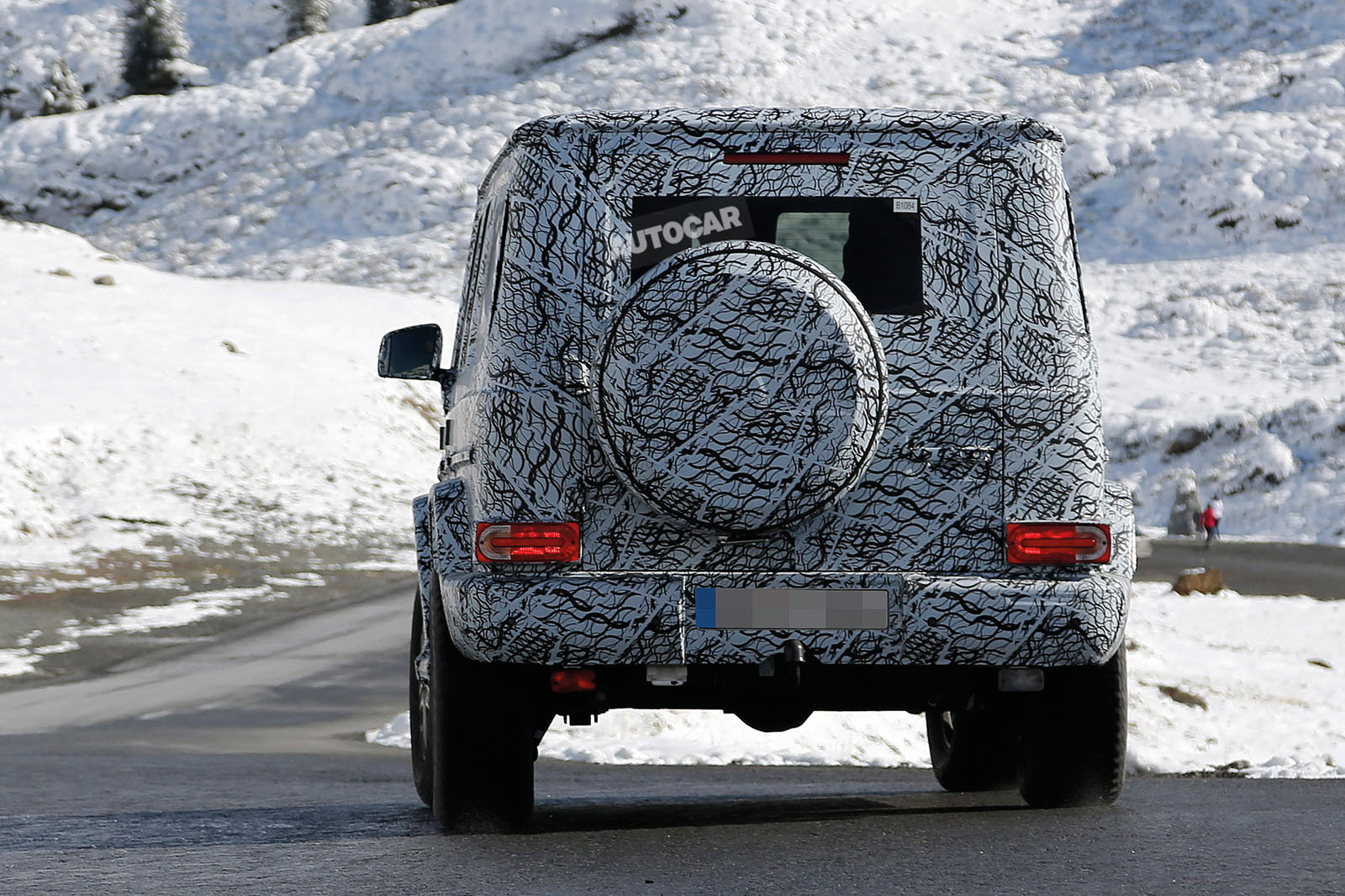
The new version of Mercedes's square-jawed off-roader, which first arrived in 1979, will be unveiled to the public at the Detroit motor show in January 2018 and go on sale in the UK in the spring. The leaked image, posted on Dutch website AutoWeek, shows the wide-screen infotainment screen and metallic trim that will be fitted to the model.
Like the S-Class's, the G-Class's dashboard features fewer buttons and a cleaner design, with metallic button controls on the steering wheel. The G-Class gets more butch metallic vent surrounds, however, as a nod to its more rugged character.

The technology fitted to the G-Class is claimed by some insiders to secure the future of the G-Class well into second half of the next decade. Much of the electronic architecture will be shared with the S-Class.
The new G-Class has adopted a completely fresh design and a contemporary aluminium construction. The move, Mercedes officials say, helps contribute to a 160kg reduction in kerb weight over today’s mostly steel-bodied model while providing a 30% increase in torsional rigidity.
The military-grade off-roader also receives a widened chassis with new front suspension as well as adjustable damping. A new electric architecture supports a widened range of driver assistance systems.
Myriad changes, hidden beneath traditionally upright styling, are claimed to boost the on-road performance. The G-Class is also in line to receive a new range of engines. These include the latest evolution of AMG’s turbocharged 4.0-litre V8 petrol unit and parent company Mercedes-Benz’s new 2.9-litre in-line six-cylinder diesel, in combination with a new nine-speed automatic gearbox.

The new G-Class’s design holds true to the look of today’s 38-year-old model with a boxy appearance that, despite a 20mm increase in width, is claimed to have the same 0.54 drag coefficient as today’s car.
The traditional styling aims to provide maximum off-road functionality. Autocar has been told the nominal fording depth of the new model has increased by up to 100mm. The approach, departure and ramp angles are all said to have been improved, too, if only marginally, over the outgoing model’s. Buyers will also be able to equip the 2018 model with a 360deg off-road camera for safer manoeuvring in tight off-road conditions.
Although early reports suggested the new G-Class was in line to adopt a monocoque construction, Autocar can confirm that it retains the tried and trusted ladder-frame chassis of its predecessor, albeit in heavily modified form.

Mercedes engineering sources say this construction provides the G-Class with new levels of crash integrity, better on-road refinement and, in combination with the new aluminium body structure, a significantly lower weight. Nothing is official yet, but the initial G500 model planned to be launched at the Detroit motor show in January is said to weigh close to 2435kg — down from the existing G500’s 2595kg. The ladder-frame chassis also helps to preserve the versatile G-Class’s 3500kg towing capacity.
As well as undergoing the usual on-road development process, the new G-Class has been extensively tested at Mercedes’ punishing off-road course in Schöckl, Austria.
The car's new interior is claimed to provide significantly improved accommodation. One source revealed that rear leg room has increased by as much as 150mm in standard-wheelbase guise. Luggage capacity is also said to extend beyond the outgoing model’s 487 litres.

Safety tech includes Active Lane Keeping Assist, and the Pre-Safe system, which activates precautionary occupant protection measures if the car senses a collision is imminent.
The new G-Class will be sold from the outset with an AMG-developed 4.0-litre V8 turbo petrol engine in two states of tune. In the G500, it has 415bhp and 450lb ft. It also receives a cylinder deactivation device that allows it to run on four cylinders under part-throttle loads in city driving conditions.
In the more highly tuned Mercedes-AMG G63, it packs 603bhp and 627lb ft, replacing the current 5.5-litre turbo V8, which delivers 563bhp and 560lb ft.
The new engines are combined with a nine-speed automatic gearbox and a heavy-duty four-wheel-drive system with three differential locks and low-range gearing.

A G400d model is planned to join the line-up later in 2018. It will run Mercedes’ new OM656 in-line six-cylinder diesel engine and develop 335bhp and 516lb ft. Other units, including a 3.0-litre in-line six- cylinder turbo petrol with an integrated starter/generator mild hybrid set-up, will follow.
Underpinning the 2018 G-Class is a new suspension system. It adopts a new independent front end as well as heavily revised geometry at the rear, both offering added levels of wheel travel and axle articulation over the old model. In a move that’s claimed to provide next year’s model with greater comfort, it receives adaptive damping control too.
Another significant change is the adoption of a new steering system. The recirculating ball system, which dates back to the 1979 G-Wagen, has been replaced by a contemporary electromechanical rack and pinion arrangement, which is claimed to bring a greater degree of precision.